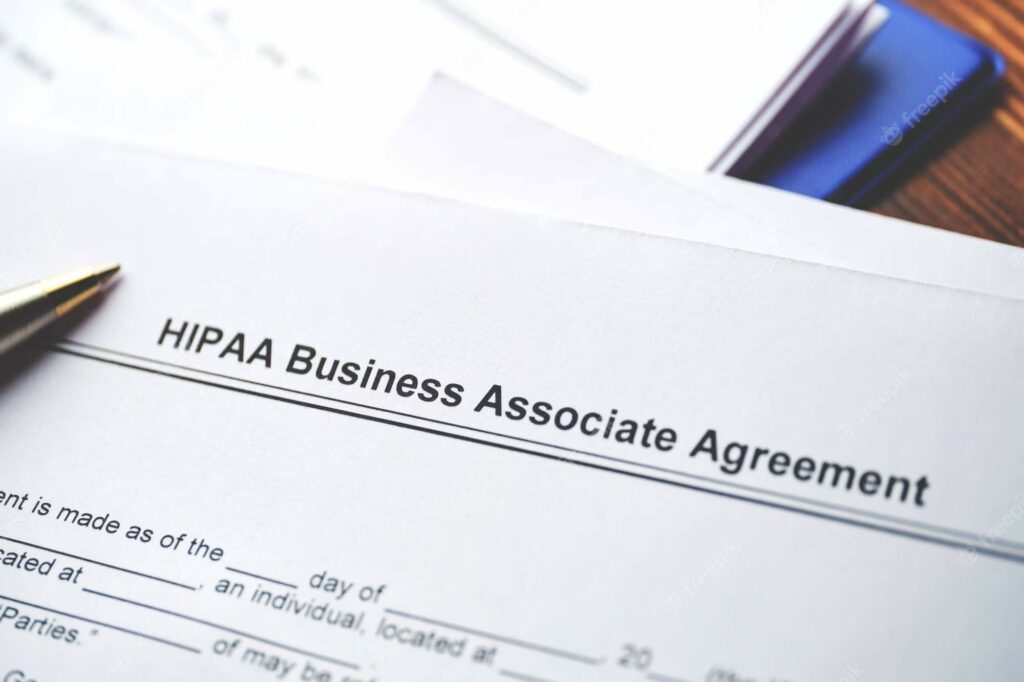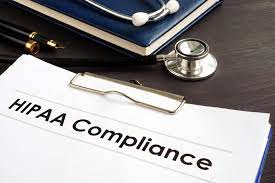

As a healthcare provider or business that handles protected health information (PHI), it’s essential to have a HIPAA Business Associate Agreement in place with any third-party vendors or contractors you work with. This agreement ensures that your business associates are also responsible for maintaining the privacy and security of patient data. That’s where our blog comes in.
We’ll explain all you need to know about the HIPAA BAA in this blog article, from what it is to how to assure compliance. By the end, you’ll know exactly how to safeguard the private information of both your clients and your company. Let’s begin.

A Business Associate Agreement (BAA) is a contractual agreement between a Covered Entity and a Business Associate that outlines the specific requirements for protecting PHI. The HIPAA Security Rule mandates that a BAA be in place whenever PHI is shared between a CE and a BA.
This agreement serves as a legally binding document that defines the responsibilities of both the Covered Entity and the Business Associate with respect to the handling of PHI. This includes the permissible uses and disclosures of PHI, the safeguards that must be in place to protect PHI, and the consequences for non-compliance with the agreement.
Not all businesses that handle Protected Health Information (PHI) are required to establish Business Associate Agreements (BAAs) in place with their business associates under HIPAA regulations. Specifically, HIPAA mandates that only certain entities, known as “covered entities,” must create BAAs. These entities include:
It’s worth noting that not all business partners working for a HIPAA-covered entity can be considered a Business Associate (BA) for the purpose of a Business Associate Agreement (BAA). Specifically, only the following individuals or entities fall under the category of HIPAA-covered Business Associates:
If you are unsure whether your organization falls under the category of a covered entity or a business associate, it’s essential to consult with legal counsel or an experienced HIPAA consultant to ensure compliance with HIPAA regulations.

A Business Associate Agreement should include several key elements to ensure that it meets the requirements of HIPAA regulations. The following are some of the essential components that should be included in a Business Associate Agreement:
To create a Business Associate Agreement, there are certain tips that can ensure that the agreement is legally enforceable and that both parties are protected. Here are some key tips to keep in mind:
As with any legally binding agreement, you need to include basic information such as the date, the full legal names of the parties involved, and how the parties will indicate acceptance of the terms. This information helps to establish the legal validity of the agreement.

In addition to the basic information, a Business Associate Agreement needs to address specific requirements related to HIPAA compliance. These requirements include:
When it comes to drafting the agreement, it’s important to keep the language clear and concise. Avoid using legal jargon that may confuse the parties involved. Instead, use plain language that can be easily understood by both parties.
If you’re not sure how to create a Business Associate Agreement that meets all legal requirements, it’s always a good idea to seek legal advice. An experienced attorney can help you navigate the complex legal landscape and ensure that your agreement is legally enforceable.
By following these tips, you can create a Business Associate Agreement that protects both parties and ensures HIPAA compliance.

When a business associate agreement (BAA) is violated, the consequences can be severe for both the covered entity and the business associate.
Firstly, it is crucial to identify the breach as soon as possible. When you identify the breach , the covered entity must take steps to address the breach or end the violation caused by the business associate.
To prevent violations of a Business Associate Agreement, it’s essential to ensure that all parties involved understand their obligations and responsibilities under HIPAA regulations. Covered entities and business associates should regularly review their agreements, conduct employee training on HIPAA compliance, and implement appropriate safeguards to protect PHI.
If these initial steps are unsuccessful, the covered entity must report the breach to the Department of Health and Human Services (HHS). The HHS has strict guidelines for reporting breaches, and failure to follow these guidelines can result in substantial fines.
Noncompliance with a Business Associate Agreement (BAA) can lead to severe consequences for both covered entities and business associates. As a covered entity, it is essential to understand the risks and potential consequences of noncompliance with a BAA.

One of the most significant consequences of noncompliance with a BAA is financial penalties. The Office for Civil Rights (OCR) is responsible for enforcing HIPAA regulations, and they can impose hefty fines on covered entities and business associates for noncompliance. The fines can range from $100 to $50,000 per violation, depending on the severity of the violation, with a maximum penalty of $1.5 million per year for identical violations.
Noncompliance with a BAA can result in severe reputational damage for both covered entities and business associates. Data breaches and other violations can cause a loss of trust among clients, customers, and business partners. Negative publicity can quickly spread on social media, and other channels, which can significantly damage the organization’s reputation.
Noncompliance with a BAA can also lead to a loss of business. Covered entities and business associates that fail to comply with HIPAA regulations can lose contracts, clients, and business partners. If an organization has noncompliance, other organizations may hesitate to do business with them, which can have long-term financial consequences.
In conclusion, a HIPAA Business Associate Agreement is an essential legal document that outlines the responsibilities of third-party vendors or contractors that handle protected health information (PHI). By following these guidelines, businesses can safeguard the private information of both their clients and their company and ensure compliance with HIPAA regulations.
And i f you are looking to implement any of the Infosec compliance frameworks such as SOC 2 compliance , HIPAA , ISO 27001 , and GDPR compliance , Impanix can help. Book a Free consultation call with our experts or email us at [email protected] for inquiries . So what are you waiting for? Start learning and growing today!